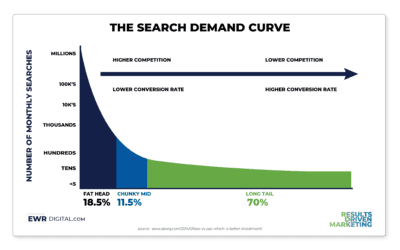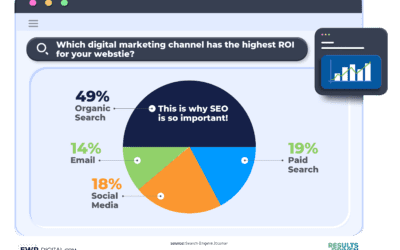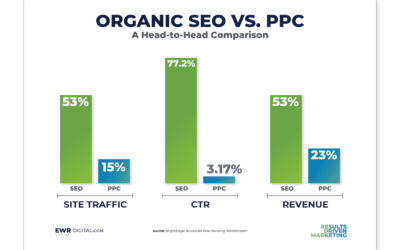As of this year, there are about 1.7 billion websites with less than 300 million active ones. More websites spawn every day by the thousands. Businesses have set their eyes towards the internet for a wider reach. The aim is simple: to bring in more customers with this...
Nonprofit Marketing
20 Steps to Mastering the Art of Storytelling
Every brand wants to get the attention of prospective customers, and storytelling is an excellent way to get a target audience interested in a brand. Brand storytelling is the process of using narratives to engage your customers and shape your brand's identity. Even...
SEO Business Plan: 7 Effective SEO Strategies You Should Be Using
Do you want to create an SEO business plan that will effectively boost your website’s visibility and ranking? Search engine optimization (SEO) plays a crucial role in keeping your website visible and ensuring it appears at the top of search results. It serves as a foundation for digital marketing strategies, but achieving high ranks requires careful planning and a deep understanding of search engine algorithms. If you’re new to the online industry, understanding SEO may seem like deciphering abstract art.
To help you navigate the world of SEO, we have compiled a list of the seven most effective strategies for your business. By incorporating these SEO trends and techniques into your plan, you can enhance your website’s visibility, outrank competitors, and drive more organic traffic to your site.
4 Essential Elements Of Powerful Brand Storytelling
As of 2015, there are over 27 million entrepreneurs in the United States, it's now 2024. Industry competition is stiff in any niche, and the sheer volume of other successful business owners doesn't make things any easier. Luckily, there are a few strategies you can...
A Beginner’s Guide to Geofencing: Everything to Know
Over 3.5 billion people around the world rely on their smartphones every day. With over 45% of the world on their phones, you have a chance to boost your business. How? With the addition of geofencing as part of your digital marketing strategy, you can target an...
When To Change Your Marketing Strategy
Your digital marketing plan may require adjustments to keep up with changing business dynamics. From budget constraints to declining ROI, changes in operations, and shifting market demands, several factors can signal the need for a new marketing strategy. Discover cost-effective alternatives, adapt to social media algorithm changes, and maintain your brand’s identity while connecting with your target audience effectively. For expert guidance and insights into evolving marketing strategies, EWR Digital is here to help. Explore our workshops and audits or get in touch with our professionals today.
The Pros of SEO For Your Website
Why is SEO for Your Website So Important?
Search engine optimization (SEO) plays a pivotal role in the success of your website. By prioritizing SEO, you can significantly enhance brand awareness, drive higher website traffic, and ultimately boost conversions. If you want to outshine your competitors, partnering with EWR Digital can assist you in crafting a robust SEO strategy that ensures your website gets the attention it deserves.
Benefits of SEO for Small Businesses
Small businesses can reap numerous benefits from implementing SEO strategies:
Positions Your Brand as an Industry Leader:
A higher website ranking instills greater customer trust, making your brand a go-to source for industry-related questions. When customers find valuable and trustworthy information on your website, they are more likely to remember your brand when they are ready to make a purchase. EWR Digital excels in helping businesses establish their authoritative voice within their respective industries.
Improves Customer Experience:
SEO techniques not only enhance website visibility but also elevate user experience. Technical SEO optimizes website speed and ensures broken links are fixed. Content marketing focuses on providing helpful and relevant content to customers. Even without the SEO aspect, delivering high-quality and engaging content that addresses customer inquiries and enriches their knowledge greatly enhances their overall experience.
Increases Your Customer Base:
By prioritizing SEO to achieve Page 1 rankings, you can expect a significant surge in website traffic. Since most users do not venture beyond the first page of search results, ranking higher increases your visibility and chances of attracting potential customers. Local businesses can particularly benefit from SEO, as it improves rankings in local searches and drives more targeted traffic. Moreover, SEO not only increases traffic but also delivers higher-quality leads, as users searching for targeted keywords are more likely to convert into customers.
Reduces Paid Advertising Costs:
Implementing SEO strategies can reduce your reliance on paid advertising. With a focus on organic traffic, SEO helps generate website visits without incurring additional costs. Furthermore, combining an SEO strategy with pay-per-click (PPC) campaigns can significantly enhance your overall results. SEO and PPC complement each other exceptionally well.
Targets Customers at Different Levels:
SEO has the versatility to target customers at various stages of the sales funnel. Through high-quality content that incorporates a range of keywords, you can reach customers at different funnel stages. Frequently asked questions (FAQ) or Q&A pages cater to customers at the top of the funnel by providing informative brand insights. Middle-of-the-funnel customers are engaged with service or product pages that offer in-depth details about specific revenue streams. Finally, SEO content aimed at customers at the bottom of the funnel, leveraging the existing trust and relationship, can include case studies, testimonials, and information on product delivery.
How to Achieve SEO for Page 1
Once you recognize the significance of SEO for your small business, it’s vital to understand the steps required to reach Page 1. Here are some tips to help you achieve a successful SEO strategy:
Focus on Quality Content:
Creating high-quality content that is engaging, informative, and incorporates your targeted keywords is crucial for SEO success.
Establish High-Quality Backlinks:
Securing backlinks from reputable industry professionals and high-authority websites helps build trust and credibility for your own website.
Understand Your Competitors:
Gaining insights into your competitors’ SEO strategies and analyzing their approach can help you identify opportunities and stay ahead.
Make Your Website Mobile-Friendly:
Given the widespread use of smartphones, ensuring your website is mobile-friendly is essential to reach and engage with mobile users effectively.
Choose Competitive and Realistic Keywords:
Effective keyword selection is paramount. Focus on ranking for keywords that are relevant to your brand and offer realistic chances of success.
Achieving Page 1 rankings requires thorough planning, including competitive analysis, keyword research, and a well-defined strategy aligned with your goals. Contact us today at EWR Digital to learn more about how our services can help you reach Page 1 and maximize your SEO investment.
Small Business SEO Vs. Enterprise SEO: What’s the Difference?
Search engine optimization (SEO) is essential for businesses to drive quality and relevant traffic to their websites. There are different SEO strategies for different sizes of websites, namely, enterprise or small business SEO, which share similarities but also have differences. The size of the business does not always correlate with the type of SEO but with the website’s size. Organic searches contribute to around 50% of website traffic, making SEO an indispensable tactic for effective marketing. Enterprise SEO is designed for businesses with a thousand pages or more, while small business SEO is designed for those with less than a thousand pages. Both types involve keyword optimization, technical soundness, monitoring and auditing, and branding, among others. However, enterprise SEO requires dealing with multiple locations, while small business SEO targets a particular location or audience. Enterprise SEO can optimize for both long-tail and short-tail keywords due to brand authority, while small business SEO focuses mainly on long-tail keywords. Understanding the differences between these SEO types is vital for businesses to achieve optimal results.








